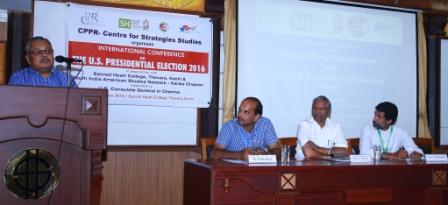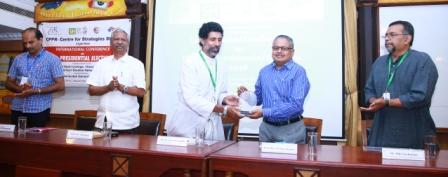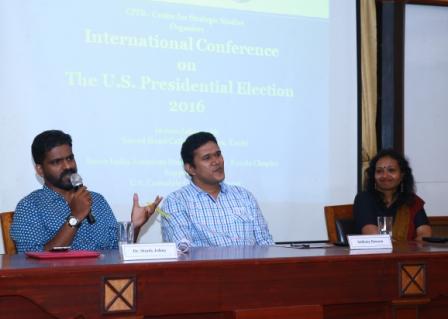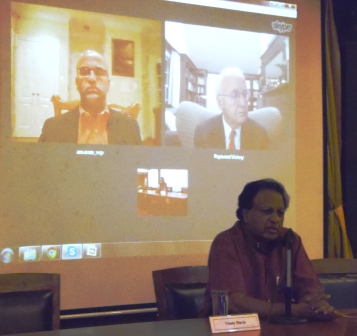Centre for Strategic Studies

Anti-establishment Sentiment Illumines US Presidential Election
September 30, 2016
High chance khadi will become extinct, if KVIC’s patriarchal view continues
October 3, 2016Proceedings of International Conference on ‘The US Presidential Election 2016’
- Academic Director CPPR
- Adjunct Faculty
- An Appraisal of the US Foreign Policy under Barack Obama
- Assistant Professor
- Central University of Kerala
- centre for public policy research
- CPPR
- cppr centre for strategic studies
- Democratic Party
- Department of International Relations & Politics
- Department of Political Science
- Donald Trump
- Dr. Josukutty C.A.
- Dr. Stanly Johny
- Dr. Uma Purushothaman
- Executive Director
- Former Ambassador of India
- Former US Assistant Secretary of Commerce Trade Development
- Hilary Clinton
- IIM Bangalore
- Indo-American Center
- International Affairs Editor
- Prof K.C Abraham
- Prof. (Dr.) G. Gopakumar
- Prof. Rajeev Srinivasan
- Raymond E. Vickery Jr.
- Republican Party
- T.P Sreenivasan
- The Hindu
- The US Presidential Election – Key Issues & Themes
- The US Presidential Election – The Indian Prospects
- U.S. Consulate Chennai
- U.S. Presidential Election 2016
- University of Kerala
- US President
- Vice Chancellor
- Vinson Palathingal
- Washington DC

A one-day International Conference on ‘The US Presidential Election 2016’, conceptualised and organised by the CPPR –Centre for Strategic Studies, Kochi in association with Sacred Heart College, Thevara, Kochi and South India American Studies Network –Kerala Chapter with the support of the US Consulate General, Chennai was held on September 26,2016.
The conclave attempted to present an overview of the ongoing US presidential election campaign by deliberating on the political parties and candidates in the fray, their policies and issues and the impact of their positions on various issues. It engaged experts on American politics and foreign policy to help develop an in-depth understanding of the changes in the election process over the years and the country’s prospective foreign policy overtures.
The speakers at the conference included T.P. Sreenivasan (Former Ambassador of India), Raymond E. Vickery Jr. (Former US Assistant Secretary of Commerce Trade Development), Prof. (Dr.) G. Gopakumar(Vice Chancellor, Central University of Kerala), Prof. K.C. Abraham(Academic Director, CPPR), Prof. Rajeev Srinivasan (Adjunct Faculty, IIM–Bangalore), Dr. Josukutty C.A.(Assistant Professor, Department of Political Science, University of Kerala), Dr. Stanly Johny (International Affairs Editor, ‘The Hindu’), Dr. Uma Purushothaman (Assistant Professor, Department of International Relations & Politics, Central University of Kerala)and Vinson Palathingal (Executive Director, Indo-American Center, Washington DC).

The conference had three thematic sessions:
- The US Presidential Election – Key Issues & Themes
- An Appraisal of the US Foreign Policy under Barack Obama
- The US Presidential Election – The Indian Prospects
Key Issues & Themes
The 2016 presidential election is critical for the US because of the polarised nature of the campaign by the Presidential candidates. Class and race identities dominate the campaign,while areas like foreign policy, defence and security take a backseat.‘Fortress America’, the perception of the US as a fortress protected by the oceans, is now a dead notion.
The US standing in the world order has diminished from what it was in the previously uni-polar world. The discontent in the domestic economy with increased inequality, stagnant wages and widespread poverty makes this the first generation of voters since the Great Depression to believe that the next generation will be worse off than they are. Yet, economic indicators were better off under Obama’s term and over 70–75% of the poll promises were fulfilled.

The wide appeal of anti-establishment candidates such as Donald Trump and Bernie Sanders and the popular resentment towards Hillary Clinton revealed the disgruntled mood of the American masses.The long established principles of the parties went for a change in this year’s campaign – Republicans, who promoted free trade has a candidate riding on nationalistic fervour,calling for more protectionism and in an uneasy coalition with businesses and social conservatives;Democrats, perceived as pro-middle class seem to be championing the cause of big businesses. This dilemma reinvigorated the Libertarian (polling at 8%) and Green (polling at 1%) parties in the US.
The US Foreign Policy under Barack Obama
The legacy of Obama’s foreign policy has many challenges,despite positive developments in the relationship with Iran and Cuba and building consensus to ratify the 2015 Paris climate deal. These include the failure to control terror outfits, failed approach towards North Korea and for a nuclear-free world, uncertainties over Trans-Pacific Partnership (TPP) and keeping Russia-China partnership in check. The ongoing stalemate in Syria, Brexit and the worsening Ukrainian crisis will prove to be contentious issues for the future US President.

Obama’s foreign policy on the Middle East was not radically different from his predecessor. From being the only administration thatsupported Israel in all its strategic decisions, to brokering a diplomatic solution to the nuclear deal in Iran, in view of its heightened regional stature.Fromhavingarrived at a consensus within the administration on not going to war in Iran based on the Iraq fiasco,tothe stoic approval of Saudi offensive against Yemen, Obama was an ideological liberal with conservative temperaments.
The Indian Prospects
The Indo–US relation has been a roller coaster ride. Even though it may seem to be on an upswing, one cannot be sure if the relation is on a permanent footing.Changes vis-à-vis India cannot be expected from the next President.Economic prosperity and military strategic security need to work in unison to scale up the Indo–US bilateral relationship. India’s ‘Make in India’ must not be at the cost of excluding imports to India.

From the perspective of Indo–American interests, Hillary’s acquaintance with Pakistan seems problematic at a time when Donald Trump aligns more with India in terms of being pro-business and his rhetoric of containing terrorism. The tax hike proposed by Clinton will hit small businesses as opposed to Trump, whose business acumen will help avoid bureaucratic mess and red tapes, improve investments and reduce taxes.
In conclusion, the 2016 presidential election campaign brings to light the vagueness in Donald Trump’s personality and the clarity in Hillary Clinton’s temperaments and attitude,which make the future of the US linked to the US presidential election outcome.
Click here to read the entire Conference Proceedings
Videos of Speakers
- Tech Admin
- Tech Admin
- Tech Admin
- Tech Admin
- Tech Admin
- Tech Admin
- Tech Admin

